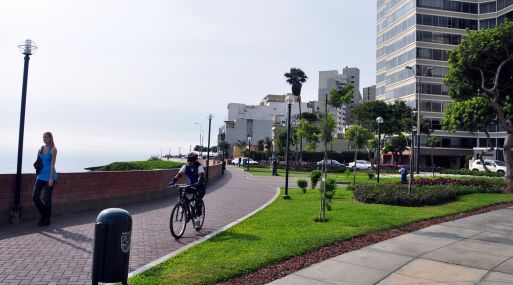

Pamela Bravo Ortiz, Deputy Manager for Environmental Development of Lima’s Miraflores District and fellow of the Sustainable cities course held in Cuenca, Ecuador, in 2015, said that the course is auspicious for sharing knowledge, lessons learned and experiences that contribute to continuous improvement by increasing the inclusion of more sustainable practices. This is one of the reasons why Miraflores endorsed its organization, said Bravo Ortiz.
On the other hand, and in parallel with the course, the Sustainable Cities project competition is being sponsored by the Universidad Científica del Sur and the OAS. The competition was launched with the objective of encouraging the development of innovative proposals on sustainability issues related to environmental development of cities. The main objective of this contest is to generate a set of ideas that can be assessed and improved during the course, which will be held in March.
To date, 10 applications have been received boasting innovative proposals on environmental quality, citizenship, and good practices, green spaces and cleanliness —Miraflores’ sustainability pillars. The winners will be awarded a four-day internship in Medellín’s Town Hall and the inclusion of their proposal in the municipality’s participative budget, the implementation of which the people of Miraflores will vote on. The following link contains additional information on contest details, open until February 28: http://sp.ecpamericas.org/Events/Default.aspx?id=640
It is worth noting that Miraflores is also an example of environmental innovation in Peru. According to the survey “Perceptions and Opinions regarding the City of Lima” conducted by Vox Populi, Miraflores is the most modern district in Lima. Likewise, one of the district’s initiatives to curb the impact of solid waste is the “Basura no es Basura” (Trash is not Trash) program. Since 2011, this program has reached the district in its entirety, engaging 51 percent of Miraflores’ families. This activity gains relevance considering that, according to the Ministry of the Environment, Lima produces 8,468 tons of solid waste daily, out of which only 4% feeds into formal recycling processes. These “ecological islands” will use solar panels that will generate electric lighting, as well as for cellular charging services.
Miraflores is also widely known for “Miraflores 360: todos juntos por la seguridad ciudadana” (Miraflores 360: all together for public safety), positioning the district as the safest in the country, and received multiple awards at a regional level. Part of the success of this initiative is that it brings together various local institutions such as the fire department, police, neighborhood council and municipal officials in weekly meetings for addressing district security as a joint endeavor. In addition, the district will soon inaugurate the country’s most modern early warning center.
The Permanent Mission of the United States to the OAS partnered with the OAS in 2013 to launch Sustainable Communities in Central America and the Caribbean, a technical assistance and competitive small-grants initiative, and trained over 560 government officials and civil society representatives through the implementation of four- to six-day Sustainable Cities Courses. Through this two-phase initiative (Phase I 2013-2016 and Phase II 2015-2017), the United States has supported the implementation of 24 community-level demonstration projects in 10 countries in Central America and the Caribbean. Sustainable Communities in Central America and the Caribbean is under the umbrella of the Energy and Climate Partnership of the Americas (ECPA).
 View Map
View Map